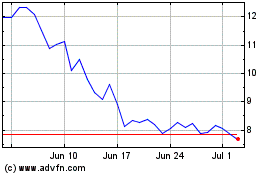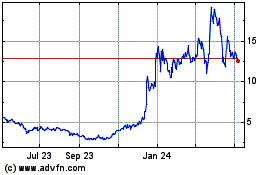Dfinity Foundation Launches $215 Million Grant To Boost Developer Ecosystem
23 December 2021 - 4:00AM
NEWSBTC
Dfinity Foundation is boosting its developer ecosystem with a $215
million grant. This is to help further the development of
decentralized applications (DApps) on the Internet Computer
blockchain. Over 115 teams have benefitted from this grant and more
are expected to do so as time goes by. NewsBTC sat down with Lomesh
Dutta, Vice President of Growth at Dfinity Foundation, to talk
about the Internet Computer Developer Ecosystem Program, how it’s
distributed, and the impact it has had on the blockchain since
inception. NewsBTC: Why was the Developer Ecosystem Program set up?
Lomesh Dutta: The CHF 200m ($215m) Internet Computer Developer
Ecosystem Program is a resource that helps developers finance the
building of decentralized apps (dapps), tooling, and infrastructure
on the Internet Computer. The Internet Computer is the world’s
first blockchain that runs at web speed and can scale without
bound. These capabilities empower developers to design new
applications and tooling without being hindered by proprietary
infrastructure or the limitations of conventional blockchains. The
ecosystem program is designed for entrepreneurs, developer teams,
and community members, supporting the growth of a new ecosystem of
dapps and services on the open, decentralized web. NewsBTC: So far,
only $2m out of the $215m grant program has been handed out. Are
there plans to ramp up this figure? Lomesh Dutta: The developer
grants program is a subset of the overall ecosystem program. For
instance, to supercharge gaming on the Internet Computer we just
announced Achievement Unblocked — a $10 million grant pool for
gaming developers in partnership with United eSports to demonstrate
how blockchain gaming will progressively enter the
mainstream. Related Reading | Cash App Launches Bitcoin
and Stock Gifting Feature For The Holidays The grant program is
designed to offer non-dilutive financing in the form of developer
grants to teams building on the Internet Computer. I think the best
way to look at the grant program right now is not the amount funded
but rather by the number and the quality of teams that have been
bootstrapped by the program. All grants are awarded in tiers of
$5,000, $25,000, and $100,000. These initial grants help teams
build early prototypes and raise larger grants, VCs, and very soon
community grants. So far, over 115 teams have received funding from
the grants program. What is super exciting is that very soon (if
the community accepts the proposal), ICP holders can easily make
their staked ICP available for “autonomous contribution” to
decentralization auctions. This is essentially a
community-powered fund that could easily be in billions of dollars
and would be available to the ecosystem projects that are building
on the Internet Computer. In return, those contributing their
staked ICP will receive governance tokens for the associated
ecosystem project — allowing them to shape the direction of the
project. Beyond financial support, our team also offers
technical support to our developer partners and grantees and often
offers ad-hoc help with co-marketing, design, and UX. Moreover, the
Internet Computer provides functionality and utility that many
other blockchains cannot, including unbounded smart contract
capacity to innovate beyond what is currently conceivable in dapp
development. This means there are both technical and marketing
support and revenue-generating opportunities on the Internet
computer that go far beyond the initial grant. NewsBTC: Dev
activity has been ramping up on Internet Computer. What effect, if
any, has this had on the blockchain? Lomesh Dutta: The developer
activity is absolutely mind-blowing. Nearly 13,000 IC smart
contracts (we call them canisters) have been deployed since
genesis, representing a roughly 20% week-over-week growth in
developer adoption. Canisters are the next evolution of smart
contracts, and unlike their predecessors, they run at web speed and
can store data in memory. This gives them the unique advantage that
any form of internet application we know about can be built
completely on-chain Related Reading | Billionaire Ray Dalio
Explains Why He Owns Bitcoin And Ethereum We’re talking about
services easily as large and complex as Facebook, Youtube, etc.,
all running on-chain. I think the world will be in complete awe
with what they are about to witness once some of these projects
start adding decentralized governance and token incentive
mechanisms to supercharge their growth. NewsBTC: What would
you say has been the biggest pull of Internet Computer blockchain
for developers? Lomesh Dutta: Internet Computer is the only
blockchain where developers can build web-scale dapps and games
completely on-chain. These dapps run at web speed and do not
require end-users to have a wallet or spend tokens to interact with
smart contracts. If your ambition, as an entrepreneur, is to build
the next Facebook, then you wouldn’t want to settle for any of that
friction. Developers are building mass-market applications that run
at web scale. Once these projects start implementing decentralized
governance and tokenization, we expect several unicorns will emerge
out of the Internet Computer ecosystem in very short order.
NewsBTC: One of the most popular dapps on IC is OpenChat. Given
that it is competing against established messaging giants like
WhatsApp and Signal, how confident are you in the project? Lomesh
Dutta: The main benefit of Openchat over Signal or Whatsapp is that
Openchat runs completely on-chain, is totally decentralized,
uncensorable, and is community governed. For example, WhatsApp
infamously announced that their privacy policy now required users
to accept that their account details, location, IP addresses, and
more will be shared with Facebook. They had little choice but to
accept the new policy or eventually lose all access to their
account. ICP trading at $23 | Source: ICPUSD on
TradingView.com This could never happen on OpenChat. By its very
design, neither the developers nor anyone else could modify,
censor, or scrape any user data. This makes us increasingly
confident in the blockchain’s future, as more users become
disillusioned by the combination of data harvesting and censorship
currently happening in many social media platforms. NewsBTC: To
wrap up, give us a brief run-down of how Internet Computer is
doing. Any exciting projects in the pipeline? Lomesh Dutta: For
one, we’re very excited to talk about the upcoming integration with
both the Bitcoin and Ethereum networks. With Bitcoin, the Internet
Computer isn’t utilizing insecure and cumbersome bridging and
wrapping services which effectively entrust users’ funds to a
third-party smart contract. Instead, the Internet Computer will
leverage its Chain Key Cryptography to integrate with Bitcoin
directly. This will give each IC Smart Contract its own Bitcoin
public key, enabling them to hold, send and receive their own
Bitcoin natively. As a result, the Internet Computer smart
contracts will gain access to bitcoin liquidity, and bitcoin will
realize powerful new smart contract functionality — opening up the
much-discussed possibilities of DeFi capabilities on bitcoin. This
power, combined with IC’s native abilities and ultimately bridging
to the Ethereum blockchain, will serve as a powerful means to bring
together the whole of web 3.0 and the backbone of the coming
Metaverse. Lastly, to make sure that this ecosystem stays
decentralized and in the hands of the people, Dfinity is instilling
an ecosystem-wide tokenized governance system for apps on the IC
blockchain, dubbed the Service Nervous System (SNS). The SNS
upgrade will allow users to vote on the direction of any given
platform — from the granular, such as user interface upgrades to
the more substantial, including control over app features and user
incentivization models. Related Reading | WikiLeaks And
Bitcoin: A Crypto Love Story? This also means entrepreneurs and
developers can bypass the need for VC funding, as the governance
system will earmark an allocation of governance tokens for a given
service. For example, this could break down to something like 25%
to developers, 25% to the community, and 50% for a treasury
reserve. Truly, whatever model is needed can be created and
deployed. We believe this places the Internet Computer at the
center of the revolution that is unfolding. Not only does it solve
all of the scaling issues present in legacy chains, but it also
does so in a way that inclusively brings them along for the ride.
This should unlock the true possibilities of web 3.0. Featured
image from CryptoSlate
Internet Computer (COIN:ICPUSD)
Historical Stock Chart
From Mar 2024 to Apr 2024

Internet Computer (COIN:ICPUSD)
Historical Stock Chart
From Apr 2023 to Apr 2024
